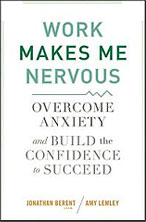Lauren
– PERFECTIONISM, PUBLIC SPEAKING DYSFUNCTION AND BURNOUT
Q: Can you describe what was going on in your life when you first called to come into the program?
LAUREN: Sure, um, I was working, uh, at a, a relatively big company. I had been there for a few years. Um, I had a, um, mid-level position but with a lot of, a lot of responsibility. I had, um, I had continually increased for the past couple years. And I was in the middle of a, um, a conference call which I had done you know several times with, uh, two of my, um, senior, um, senior employees. And during the call someone passed over their presentation to me before I was really ready to talk about, um, that, uh, particular product. And at that moment I was you know felt unprepared, kinda caught off guard and I started to feel my, uh, heart race and started to feel, uh, short of breath and kind of went through something very quickly in about a minute when I probably would of spent a lot more time on describing that part of the product. Kinda passed it over to the next person. And you know after that call I realized that you know something had happened during that call that was not normal for me and that I’d had you know a, a, an anxiety episode. Um, that happened probably another four or five times in the next few months. A lot of times when it was you know something pretty high level with a big client, with a lot of my, you know senior people on the phone when I hadn’t had a lot of time to prepare. And, you know after those few months that’s the first time that I kind of you know realized that this was a pattern. That this was something that, um, was obviously not, uh, kinda going away.
Q: Had you ever had a panic attack before?
LAUREN: No, I had never had one.
Q: Did you have a series of them in a short period of time?
LAUREN: Yes.
Q: How was this impacting your life?
LAUREN: Um, it was very, it was very, very difficult for me to deal with. I was very confused about what was going on. This had never happened to me before. Um, again this wasn’t a new job. I had been there for years, um, I had spoken in front of people before. I had done meetings and calls with clients before. And I was just, I was very confused and I was very scared about what was happening because I felt like it was really impacting my ability to do my job well. And it was making me you know basically fear the, the going into the office and having these kinds of things happen over and over again.
Q: Why did you take a leave of absence?
LAUREN: Um, I think a, a few reasons you know what was happening was obviously one of them and it was the type of thing where you know these kind of responsibilities were just gonna get more and more for me. So it was gonna be, a, a, a situation where every day I was found in these situations. That was one reason. The second reason was I had already for quite some time even before the, the first time I had the panic attack. Had been thinking about a career change, and that was really for, just because I wanted to be in another field. It really had nothing to do with this. But it was really kind of those, the, the anxiety that was happening sort of I think pushed my decision kind of faster to take the time off and figure out what I wanted to do. But also deal with what was happening.
Q: How was your mood during this period of time?
LAUREN: I would say I was, um, well I felt a lot of stress, um, because of everything going on. The responsibility and what was happening. I, you know for me I think that I was pretty depressed. Um, I didn’t like the job on top of which all of this was sort of, was coming into play making it harder for me to do it well. I didn’t know if I should leave, if I should stay. Um, and I was working you know a lot of hours during the day. So I would come home and I was basically exhausted and depressed.
Q: What else was going on with the worrying?
LAUREN: Yes, uh, yes I think so. I mean before I was just you know always stressed at work, not really loving it either but I knew I could kinda do the job. When the anxiety set in I was just, I had a lot of worry on top of everything else like you know what, what is happening you know why am I not able to do this. I was able to do it before. What am I gonna do if I leave here? So yeah, I think that was another layer on top of that.
Q: Would you say that you were obsessing?
LAUREN: Yes, I think so. Um, I think I was, I had always wanted, um, to, to leave but I felt like okay I’m gonna do this and then you know I’m gonna leave at the top of my game and you know that’s gonna be my decision. And when all of this happened I think that kind of threw me and, and I was sort of obsessing about everything.
Q: Would you say you’re a perfectionist?
LAUREN: Uh, definitely yes.
Q: Give some insight on your school experience.
LAUREN: Yeah, I mean I, I went to a, a very competitive—I had done w-well in high school. I went to a very competitive college, I had a very difficult major, um, I had always been a straight A student in highs school. So I, you know I wanted to be a straight A student in college, which meant, um, for what I was doing a lot of studying, a lot of time you know, basically a lot of time studying. Um, and I had that, you know that, basically that mentality throughout college and I think that continued when I left and took, you know took my first job of sort of really wanting to do everything I did, you know perfectly.
Q: Give an example of how you were obsessing and needing to be perfect.
LAUREN: Sure, um, I think that you know by the time that I had this kind of responsibility I really knew my area fairly well for, for my, my level and I had gotten you know several sort of promotions along the way. Which obviously you know people give that to you because they think your ready to sort of do the next step. I always, um, you know I was always feeling like I needed to know something top to bottom 100 percent before I could go talk to somebody about it. Which is really kind of you know impossible in many situations because these, uh, you know the things that we were dealing with had a lot of detail, had a lot of layers. So for me you know when I had a presentation I would kinda sit there and even if I know you know probably 90 percent of what anyone would talk about the next day. I always felt compelled to know, you know, that last ten percent down to the last detail before I personally felt ready. Which meant you know I, I never felt ready.
Q: On a scale of one to ten, measuring the severity of your problems when you started the program, what was it?
LAUREN: Um, I would probably give it a, a, a nine to ten at certain times.
Q: Where do you think your at now?
LAUREN: Right now I think that.
Q: Number wise?
LAUREN: Yeah, I mean I think I’m probably at a, um, probably at like a four or five, but given that I’m sort of going into the next phase for, for myself of things that I want to challenge myself at, um, but you know if I had to judge right now I would say I’m at about a four, four or five.


